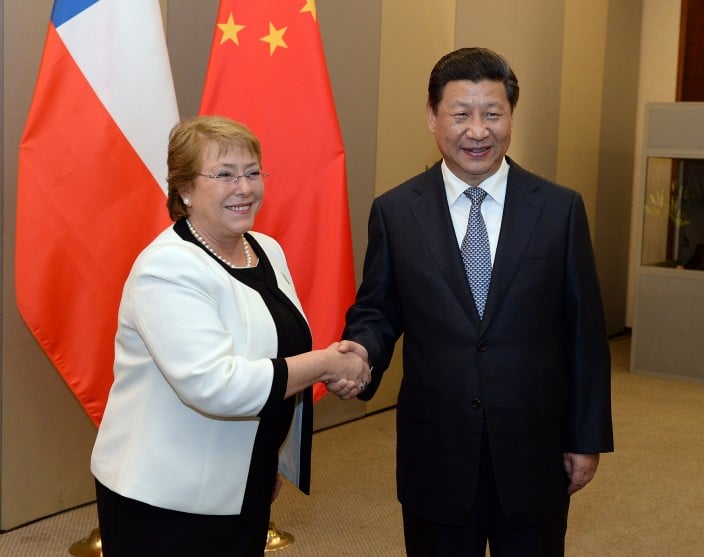The U.S. and Our Allies Must Stand Up to China on the Human Rights Council

By Amb. Andrew Bremberg, VOC President and CEO
Will the U.N. Human Rights Council finally take up the issue of Communist China’s oppression of the Uyghurs? That’s the most important question as the council begins its latest session on June 13. Since the end of its most recent regular session in April, the most damning evidence to date of Beijing’s tyranny in Xinjiang province has emerged. It may be now or never for the United States and like-minded countries to push the council to hold the Chinese Communist Party accountable.
The backdrop to the new session was informed by two events. First, the U.N. High Commissioner for Human Rights Michele Bachelet conducted an embarrassing tour of China, including Xinjiang, in late May. She praised the regime’s “tremendous achievements” on human rights, while repeating Beijing’s propaganda that internment camps in Xinjiang are part of “deradicalization” policies. Having worked with her at the U.N. in Geneva, I fear the commissioner will maintain these claims in the council’s session. She will also likely continue to withhold her office’s official report on Xinjiang, which has been three years in the making and repeatedly delayed.
The second event coincided with Commissioner Bachelet’s trip, when my organization published a massive trove of documents and images from Beijing’s de facto concentration camps in Xinjiang. The Xinjiang Police Files, provided to us by an anonymous hacker who broke into the province’s police database, show the grim reality the commissioner ignored.
The cache contains more than 2,800 images of detained Uyghurs, many crying, in handcuffs, or behind bars, with ages ranging from 15 to 73. It also includes internal police documents detailing the methods of detention, including unmistakable phrases like “shoot first, report later.” Finally, we obtained private speech transcripts in which senior Communist officials call for detaining Uyghurs en masse while stating the direct involvement of Chinese President Xi Jinping in the genocidal campaign. These images and documents, which we have independently authenticated, blatantly expose Beijing’s lie that what’s happening in Xinjiang is really “vocational education.”
The Xinjiang Police Files deserve the Human Rights Council’s full attention. At least six current members—including the United Kingdom, Germany, the Netherlands, Franceand Finland—have already denounced Communist China in response to our reporting. Germany has even committed to changing its China policy to put a stronger emphasis on human rights.
The final member, the United States, has also reacted to our reporting by criticizing Beijing. Secretary of State Antony Blinken said the findings “offer further proof of arbitrary detention,” and U.N. Ambassador Linda Thomas-Greenfield said she was “horrified.” Yet as the council’s latest session prepares to start, there is no indication any of these countries plan to run a resolution calling for an official investigation or condemnation.
This is a grave mistake. Having served at the U.N. in Geneva, I suspect the U.S. and its allies don’t think such a resolution would pass. Yet that’s not necessarily true. Forcing a debate is essential to bringing other countries on board and even spurring the council to rare positive action. It has happened before—most recently with Russia, Venezuela and North Korea—and it should happen again.
The U.S. and its allies should work behind the scenes to convince like-minded countries to join it, while pressuring other nations to abstain using a combination of carrot and stick, thereby lowering the number of votes needed for passage. Most members of the Human Rights Council may not care about human rights, but they can still be encouraged to vote the right way. If the vote succeeded, the council could compel the commissioner to begin a full and honest investigation of Communist China’s atrocities. Hopefully that won’t be Commissioner Bachelet, who should either resign, as more than 200 human rights organizations have called for, or be replaced when her term expires later this year.
Even if a resolution did fail, it would be worth the effort, not least for the moral message it sends. The U.S. and other human-rights-loving countries could honestly say they tried to push the Human Rights Council to live up to its name. When rejoining the council last October, President Joe Biden promised the U.S. would be a “constructive voice,” while Secretary Blinken vowed to “work hard to ensure the Council … better supports those fighting against injustice and tyranny.” Surely that means calling out Communist China in light of the latest evidence.
No one expects the Human Rights Council to become a beacon of freedom and justice. Yet we should still expect the council to do its job and debate real human rights abuses, particularly the most egregious violations. The latest evidence decisively dispels Beijing’s longstanding denials and obfuscations. If the U.S. and its international partners don’t make Communist China’s oppression in Xinjiang a main focus of the council’s new session, then it’s hard to see it ever happening.
Andrew Bremberg is president and CEO of the Victims of Communism Memorial Foundation. He served as the U.S. ambassador to the United Nations in Geneva from 2019 to 2021.

